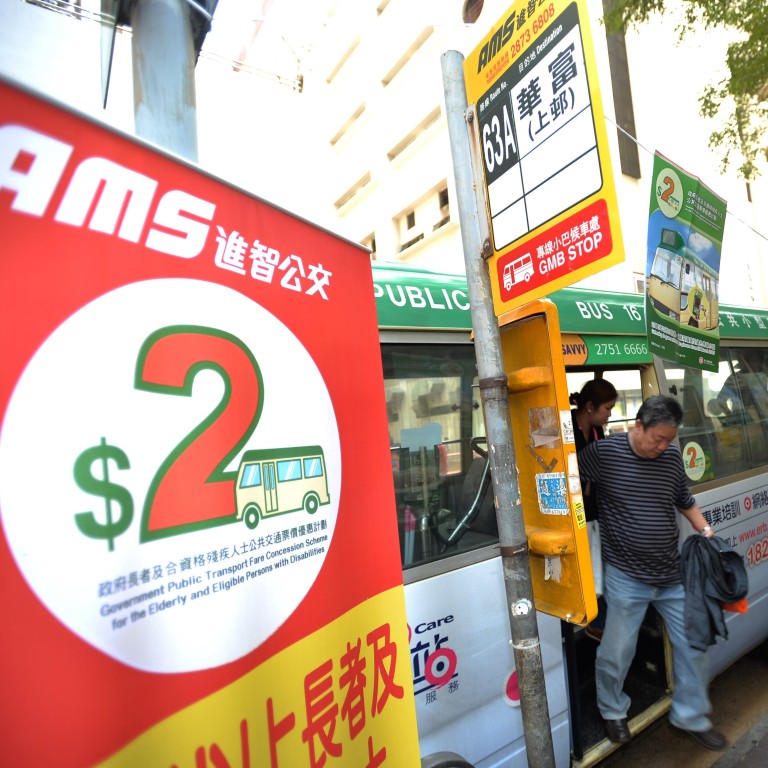
600,000 elderly Hong Kong residents will need to apply for new personalised Octopus card for HK$2 fare scheme
- New cards issued by the city’s largest e-payment provider for those aged between 60 and 64 will show the user’s name and recent profile photo
- Welfare chief says move necessary to prevent abuses of programme that could cost Hong Kong more than HK$100 million annually
Some 600,000 elderly Hong Kong residents will need to apply for new, personalised Octopus cards to benefit from a discounted public transport scheme, which has been extended to cover red minibuses, ferry services to outlying islands and trams.
The new personalised cards issued by the city’s largest e-payment provider, Octopus, for those aged between 60 and 64 will show the user’s name and a recent profile photo.
Secretary for Labour and Welfare Law Chi-kwong on Tuesday said adding personal details to the new card was crucial to correctly verify the age and identity of the cardholder and prevent what he suggested was the ongoing abuse of the scheme’s flat-rate HK$2 fare on public transport.
“Given the ageing population, and the lack of means-testing for the HK$2 scheme, any abuse ... of the scheme will pose a large financial cost in the long term,” Law said, adding the government could lose more than HK$100 million annually if people continued abusing the scheme.

Since the Octopus cards currently used for the programme can be purchased without proof of age or identity, Law said it would be easy for residents to buy several of them, then give them to other family members or even out-of-town visitors.
“If they want to use this scheme, they will have to apply for the personalised cards and that will amount to 1.3 million [users] by 2024,” Law said, referring to persons aged over 60.
He added it was hoped that those wishing to apply could register for the cards as early as the third quarter this year.
Law said the new cards would be issued within a 13-month timeline and gradually be implemented starting in the first quarter next year.
The plan to reduce the threshold age from 65 to 60 has been delayed by two years after first being promised in early 2020. Its postponement has been sharply criticised.
Hong Kong to press on with HK$2 public transport scheme extension
The fare concession scheme, which first launched in 2012, currently allows seniors aged 65 and above, as well as residents with disabilities, to pay discounted fares of HK$2 per trip on designated public transport such as the MTR train system, franchised buses, ferries and green minibuses.
Law also revealed on Tuesday that the scheme would be extended to cover red minibuses, ferry services to outlying islands – known as kaito ferries – and the city’s historic tramways.
He refused to divulge the government’s exact expenditure on the plan, saying details would be unveiled in the annual budget next month.
Meanwhile, a government-commissioned review of transport concession fares published on Tuesday projected that spending on the scheme would surge about sevenfold over the next 13 years, from HK$1.2 billion in 2018 to HK$8.6 billion in 2031.
That figure, which takes into account the expansion of the scheme to other modes of transport, will see the percentage of the city’s social welfare budget devoted to the discount grow from 1.6 per cent to 5.3 per cent over the period.

In 2018, the average elderly person or person with disabilities made 305 journeys under the HK$2 scheme, a total of more than 435 million trips. Under the newly expanded scheme, the number of discounted trips was expected to grow to about 1.2 billion.
Between 2012 and 2018, the average number of anonymous users of the special Octopus cards increased by 10.1 per cent, despite the city’s elderly population growing by just 4.3 per cent in the same period, according to the report.
“No data on the magnitude of these fare abuses is available, but it is believed that the risk of abuse could be quite high, as anonymous elderly cards can be freely purchased by any person without proof of age or identity,” the report noted.
Last January, Chief Executive Carrie Lam Cheng Yuet-ngor promised to expand the scheme by lowering the age threshold from 65 to 60, at an estimated cost of HK$1.7 billion (US$219 million), provided there were measures to stop people from misusing the system.
Major international cities including Singapore, Macau, New York and London already require residents to apply for personalised transport cards that include a photo to qualify for fare concessions for the elderly or persons with disabilities.

